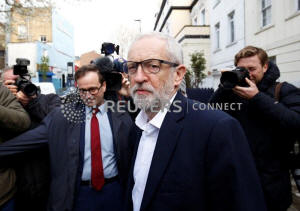|
Brexit gamble: UK's May to meet
opposition leader to forge a deal
 Send a link to a friend
Send a link to a friend
 [April 03, 2019]
By William Schomberg, James Davey and Elizabeth Piper [April 03, 2019]
By William Schomberg, James Davey and Elizabeth Piper
LONDON (Reuters) - British Prime Minister
Theresa May will try to thrash out a Brexit compromise with opposition
leader Jeremy Corbyn on Wednesday, a gamble that could see a European
Union divorce deal finally clear parliament but also tear her party
apart.
The United Kingdom was supposed to leave the EU last Friday, but three
years after Britons voted for Brexit in a referendum, it is still
unclear how, when or even if it will exit the bloc.
After her EU withdrawal deal was rejected three times by lawmakers, with
parliament and her Conservative Party hopelessly divided over Brexit,
May said on Tuesday she would talk to Corbyn in a bid to overcome what
is now a national crisis.
However, by approaching Corbyn, a veteran socialist deeply disliked by
many Conservatives and mocked by May herself as unfit to govern, she
risks enflaming Conservative divisions. One minister quit on Wednesday.

"It now seems that you and your cabinet have decided that a deal -
cooked up with a Marxist who has never once in his political life, put
British interests first - is better than no deal," Nigel Adams said as
he resigned as a minister for Wales.
A hardcore eurosceptic group of Conservative has refused to back the
divorce deal she struck with the EU, saying it did not represent a
decisive break with Europe.
Her decision to turn to Labour, which wants to stay in a customs union
with the EU, may make a "soft" Brexit that keeps Britain's economy
closely aligned to the world's biggest trading bloc more likely.
Brexit Secretary Stephen Barclay said the government would accept a soft
Brexit if lawmakers voted for it.
"If an agreement is reached between the two respective leaders then my
expectation is that there would then be a stable majority to deliver on
that," he told a parliamentary committee.
Sterling rose on hopes for a softer Brexit, hitting its highest level
since March 28.
SHORT DELAY?
May also said on Tuesday she would seek another delay - "as short as
possible" - to the current Brexit date of April 12. She
has repeatedly said she did not want an extension which would see
Britain having to take part in European Parliament elections on May 23.
European Council President Donald Tusk said it was not certain how
European leaders would view her request. Austrian Chancellor Sebastian
Kurz said there was currently no reason to agree an extension. Irish
Foreign Minister Simon Coveney said Ireland would support a delay.
As it stands, Britain will still leave the EU on April 12 without a
deal, something many Conservative lawmakers would like to happen but a
scenario businesses fear could wreak chaos and cause huge economic
damage.
A survey of services firms ranging from banks to high-street
hairdressers on Wednesday suggested the world's fifth-biggest economy
was likely to shrink in the coming months because of Brexit uncertainty.
[to top of second column]
|

British opposition Labour Party leader Jeremy Corbyn leaves his home
in London, Britain, April 3, 2019. REUTERS/Henry Nicholls

A cross-party group of British lawmakers will try on Wednesday try
to rush through legislation in parliament to make such an outcome
impossible.
DIVISION
May and Corbyn may well struggle to find a compromise position that
can satisfy their own parties.
"I realize some of you will be concerned about the government
discussing the way forward with the opposition," May said in a
letter to Conservative lawmakers on Wednesday.
"However, with some colleagues unwilling to support the
government...this is the only way to deliver the smooth, orderly
Brexit that we promised."
The Conservatives have been divided over Europe for three decades,
leading to the demise of three former prime ministers, David
Cameron, John Major and Margaret Thatcher.
Labour is far from united itself. Many supporters want the party to
throw its weight behind a second referendum but some Labour
lawmakers, who represent areas that voted strongly to leave the EU,
are against.
Corbyn, who voted against joining the bloc in 1975, has said Brexit
should include a customs union with the EU and protection for
consumer and environmental standards, and workers’ rights.
IT'S A TRAP
One pro-EU Labour lawmaker, Ben Bradshaw, said he had concerns about
the risks of getting into talks with May.
"It is clearly a trap designed to try to get May’s terrible deal
through, which some people have fallen for, but Labour mustn’t," he
wrote on Twitter.
It is also unclear where May's last-ditch attempt to get a Brexit
deal through will leave her minority government.
She has promised to step down if her withdrawal agreement is passed
by parliament and her overture to Corbyn has alienated some
Conservatives still further.

"She needs to take a long look in the mirror and for the good of our
country, our democracy and the Conservative Party she needs to go
now," lawmaker Andrew Bridgen told Sky News.
The Democratic Unionist Party, the small Northern Irish party on
whose support May relies on to govern, was also wary.
(Additional reporting by Elisabeth O'Leary and David Milliken;
Writing by Michael Holden; Editing by Angus MacSwan)
[© 2019 Thomson Reuters. All rights
reserved.]
Copyright 2019 Reuters. All rights reserved. This material may not be published,
broadcast, rewritten or redistributed.
Thompson Reuters is solely responsible for this content. |